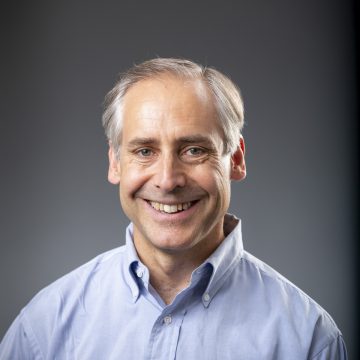Henry N. Higgs, PhD, a professor of biochemistry and cell biology at Dartmouth’s Geisel School of Medicine, has been named the John La Porte Given Professor in Cytology.

Higgs, a member of Dartmouth’s faculty since 2001, is a noted biochemist and cell biologist whose research focuses on understanding the mechanisms used by cells to regulate their internal skeletons, commonly known as the cytoskeleton. Recently, his lab has found fascinating links between the cytoskeleton and mechanisms cells use to generate energy.
“Since his arrival at Geisel, Dr. Higgs has been a national leader in demonstrating the different ways that a cell’s internal skeleton orchestrates cellular functions,” says Duane Compton, dean of Geisel. “His work exemplifies how much remains to be learned about the basic workings within our cells, and the ways that important discoveries emerge from basic science.”
The John La Porte Given Professorship in Cytology was one of two endowed chairs established in 1964 with gifts from the Iren Heinz Given and John La Porte Given Foundation, Inc. The Givens were generous benefactors of medical institutions and universities nationwide. The two professorships—one named for John La Porte Given and the other for Irene Heinz Given—were the medical school’s first fully-funded endowed chairs.
“I’m proud and humbled that Geisel considers me worthy of this honor,” says Higgs. “The medical school has been very supportive of my work over the years and receiving the additional resources that this will provide will allow us to really drive our projects forward. I’m quite excited—I think our biggest contributions are happening now and will be happening in the very near future.”
A major feature of the cytoskeleton are actin filaments. The Higgs Lab is a leader in examining actin’s roles in regulating energy generation and keeping energy generating systems functional. These mechanisms are particularly important in long-lived cells like neurons. His work has exposed previously unknown mechanisms by which energy generation is regulated—providing new insights into how these processes work in healthy cells and how they are altered in disorders like Parkinson’s disease, Alzheimer’s disease, and cancer.
Higgs has been recognized with several awards for his work, including a Pew Biomedical Research Scholarship and a National Institutes of Health (NIH) Service Award. He serves on the Editorial Board of Current Biology, is a member of the American Society of Cell Biology and has served as a standing member of the NIH’s Nuclear and Cytoplasmic Structure/Function and Dynamics Study Section. Within the Dartmouth community, Higgs is also a mentor for the interdisciplinary bioMT project—an NIH-sponsored COBRE grant to support junior faculty.
Founded in 1797, the Geisel School of Medicine at Dartmouth strives to improve the lives of the communities it serves through excellence in learning, discovery, and healing. The Geisel School of Medicine is renowned for its leadership in medical education, healthcare policy and delivery science, biomedical research, global health, and in creating innovations that improve lives worldwide. As one of America’s leading medical schools, Dartmouth’s Geisel School of Medicine is committed to training new generations of diverse leaders who will help solve our most vexing challenges in healthcare.